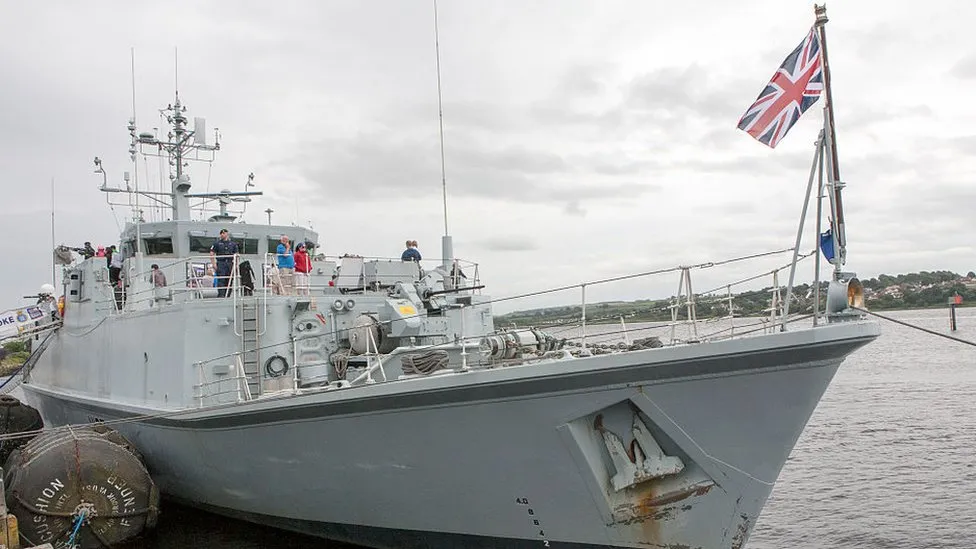UK to give two Royal Navy minehunter ships to Ukraine
The Royal Navy will transfer two of its minehunter ships to Ukraine in a bid to strengthen the country's sea abilities, the Ministry of Defence has said.

Defence Secretary Grant Shapps said the vessels would help to reopen "vital export routes" - limited since Russia launched its invasion of Ukraine.
But questions remain over how they will be able to enter the Black Sea.
The MoD said the UK was also launching a "maritime coalition" with Norway, to garner long-term support for Ukraine.
Grant Shapps, the defence secretary, told BBC One's Breakfast that the ships would make a "significant difference", boosting efforts to clear mines from the Black Sea, and that the coalition would help build a Ukrainian navy fit to defend the country in the future.
He dismissed suggestions that western nations were losing interest in the war in Ukraine.
"We believe that we simply can't have an outcome where an autocratic dictator walks into a neighbouring democratic country and then the West gets bored of it," he said.
"That is an unacceptable outcome. That is why the UK will keep reminding people that that can't happen."
The defence secretary earlier said that the bid to improve Ukraine's navy "marks the beginning of a new dedicated effort by the UK, Norway and our allies to strengthen Ukraine's maritime capabilities... enhancing their ability to operate in defending their sovereign waters and bolstering security in the Black Sea".
"As an island nation with a proud maritime history, the UK and Royal Navy are particularly well-placed to support this endeavour, which will form part of a series of new coalitions formed between allies to ensure an enduring military commitment in support of Ukraine."
The provision of two Royal Navy minehunters to Ukraine has been in the works for a long time. They were part of a package of UK maritime support, promised before Russia invaded Ukraine.
The Royal Navy has been training Ukrainian crews over the summer in how to use the ships.
However, there are still questions as to how or when they will be able to enter the Black Sea - with Turkey controlling access through the Bosphorus.
It highlights concerns about the immediate impact of maritime support on the war in Ukraine. Over the last six months, Ukraine has successfully targeted Russia's Black Sea fleet in Crimea - using drones and long range missiles.
The eastern European country still needs to rebuild its own navy, though, and to do that it will need not just support from western nations - such as the UK and Norway - but access to sail through the narrow strait between the Mediterranean and Black Seas.
After invading Ukraine last February, Russia's navy blockaded the country's Black Sea ports, causing both naval and export issues - including trapping 20 million tonnes of grain.
Ukraine is one of the world's biggest suppliers of crops such as sunflower oil, barley, maize and wheat.
"Strengthening the Armed Forces of Ukraine (AFU)'s maritime capabilities, in particular countering the threat from Russian sea mines, will help restore Ukraine's maritime exports," the MoD said.
In July 2022, a deal brokered by Turkey and the UN was agreed, allowing Ukraine to safely export grain from its Black Sea ports.
But Russia later pulled out, accusing Ukraine of a "massive" drone attack on its fleet in Sevastopol, Crimea.
As part of the new coalition between the UK and Norway, the MoD said there would be a focus on "the rapid development of a maritime force in the Black Sea, continuing to develop a Ukrainian Marine Corps, and river patrol craft to defend coastal and inland waterways".
-bbc







